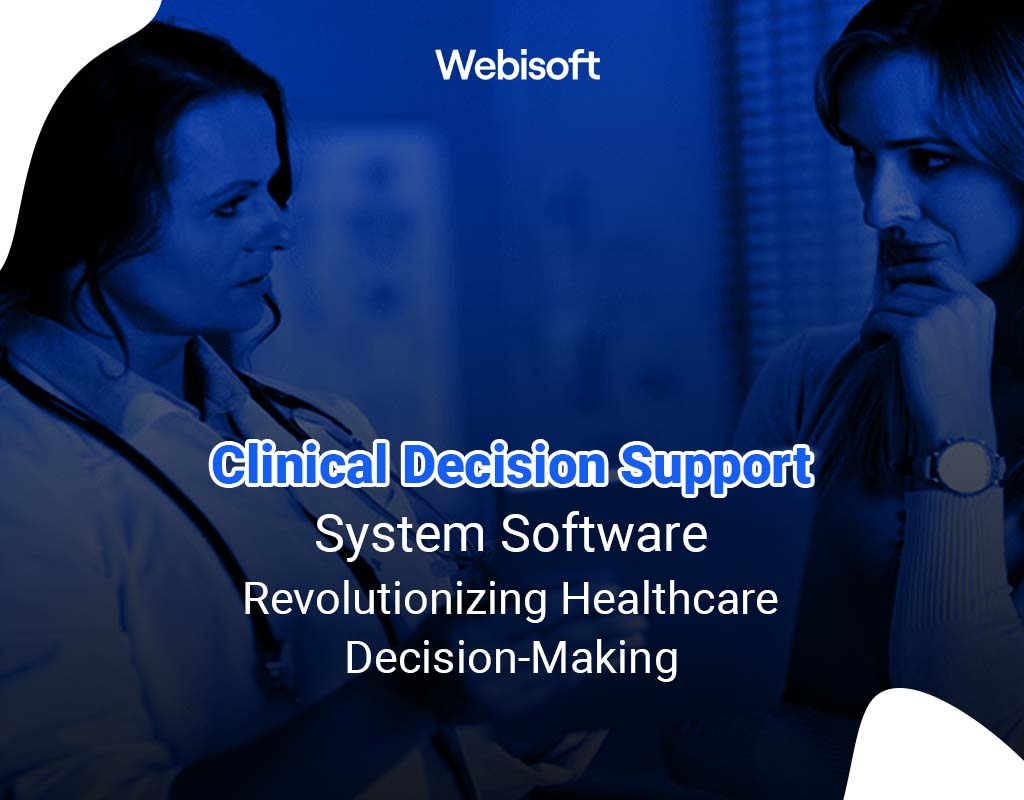Clinical Decision Support System Software, often called CDSS, is a beacon of innovation in the healthcare sector. This revolutionary technology is redefining the landscape of medical decision-making.
A CDSS is not just a tool; it’s a game-changer, a catalyst for improved healthcare outcomes. The core function of CDSS is to assist healthcare professionals in making sound clinical decisions.
It achieves this by providing evidence-based recommendations. These recommendations are tailored to the patient’s unique health profile, ensuring personalized care.
CDSS operates on the principles of data analysis and machine learning. It sifts through vast amounts of patient data to identify patterns and correlations. Consequently, it offers insights that might otherwise go unnoticed.
The result? More informed decisions, better patient outcomes, and enhanced healthcare efficiency. The benefits of CDSS are manifold. For starters, it reduces the risk of human error in clinical decision-making.
By providing data-driven insights, it minimizes the chances of oversight or misdiagnosis. Moreover, it streamlines decision-making, saving precious time in critical situations.
CDSS also plays a crucial role in preventive healthcare. This proactive approach can prevent the escalation of health issues, reducing the burden on the healthcare system.
But what exactly is CDSS, and how can it benefit the healthcare industry? Let’s delve into the details.
Contents
What is Clinical Decision Support Software?
Clinical Decision Support Software, or CDSS, represents a significant advancement in health information technology. This system is purpose-built to aid healthcare professionals in their decision-making process.
The primary goal of CDSS is to enhance healthcare quality by providing relevant, personalized information at the right time. At its core, CDSS is a sophisticated tool that leverages data to improve healthcare outcomes.
It operates by analyzing patient-specific information and presenting it in an intelligible manner. This process allows healthcare professionals to make informed decisions based on the patient’s unique health profile.
One of the critical features of CDSS is its ability to filter and present information intelligently. The software sifts through vast amounts of data to identify the most relevant information. By doing so, it ensures that healthcare professionals have access to the correct information when they need it.
CDSS is not just for healthcare professionals. Patients, too, can benefit from this technology. By providing patients with personalized health information, CDSS empowers them to take an active role in their healthcare. This patient-centric approach can lead to improved health outcomes and greater patient satisfaction.
The use of CDSS extends beyond individual patient care. It also has a crucial role in public health initiatives. CDSS can identify health trends and inform policy decisions by analyzing population health data. This broader application of CDSS can contribute to improved public health outcomes.
Despite its many benefits, the use of CDSS is challenging. Data privacy, system interoperability, and user acceptance need to be addressed. However, with the right strategies in place, these challenges can be overcome.
Different Categories of CDSS
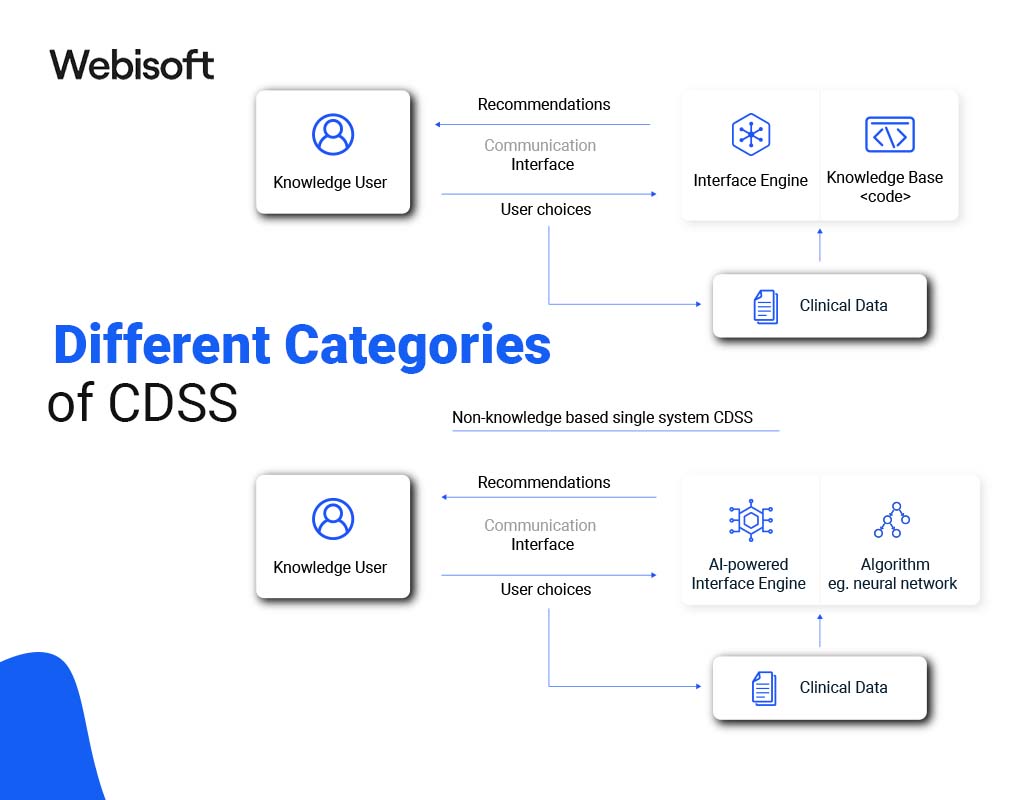
Clinical Decision Support Software is a powerful tool that can revolutionize healthcare. Providing personalized, timely information can improve patient outcomes, enhance healthcare efficiency, and contribute to public health.
As the healthcare industry continues to evolve, the role of CDSS is set to become increasingly important. The future of healthcare decision-making is here, powered by Clinical Decision Support Software.
CDSS can be categorized into several types, each serving a unique purpose:
1. Knowledge-Based Systems
Knowledge-based systems are a cornerstone in Clinical Decision Support Systems (CDSS). These systems function by comparing patient-specific data with a pre-established knowledge base.
This knowledge base comprises a set of rules derived from extensive medical research and clinical guidelines. The system generates pertinent recommendations when the patient’s data aligns with these rules.
This approach ensures that healthcare decisions are firmly rooted in well-established medical knowledge. It leads to improved patient outcomes.
2. Non-Knowledge-Based Systems
Non-knowledge-based systems form another crucial category of CDSS. Unlike their knowledge-based counterparts, these systems do not rely on pre-defined rules. Instead, they utilize the power of artificial intelligence to identify patterns within patient data.
Machine learning algorithms sift through vast data to uncover correlations and trends. This approach allows for detecting patterns that might otherwise remain unnoticed, leading to more personalized and effective healthcare solutions.
3. Clinical Guidelines Systems
Clinical guidelines systems constitute the third category of CDSS. These systems focus on providing evidence-based recommendations to assist in patient care.
They draw upon a wealth of clinical research to offer guidance on best practices. By doing so, they ensure that patient care aligns with the latest medical research. It leads to improved healthcare quality and patient satisfaction.
4. Diagnostic Assistance Systems
Diagnostic assistance systems make up the fourth category of CDSS. These systems are designed to aid clinicians in diagnosing diseases. They analyze patient data to identify signs of specific conditions.
This process can help clinicians make accurate diagnoses. It leads to more effective treatment plans. Diagnostic assistance systems can significantly reduce the risk of misdiagnosis, thereby improving patient outcomes.
5. Therapy Critiquing and Planning Systems
The final category is therapy critiquing and planning systems. These systems provide feedback on proposed treatment plans. They analyze the plan in light of the patient’s health profile and provide critiques or suggestions for improvement.
This feedback can help clinicians optimize treatment plans for better patient outcomes. Therapy critiquing and planning systems can lead to more personalized and effective treatment strategies, enhancing healthcare quality.
Each category of CDSS serves a unique purpose, but they all share a common goal: to improve healthcare decision-making. By providing timely, personalized, evidence-based information, CDSS can enhance patient care, improve health outcomes, and increase healthcare efficiency.
As the healthcare industry continues to evolve, the role of CDSS in healthcare decision-making is set to become increasingly important. The future of healthcare is here, powered by Clinical Decision Support Systems.
What are The Functions of CDSS?
CDSS serves several critical functions in healthcare:
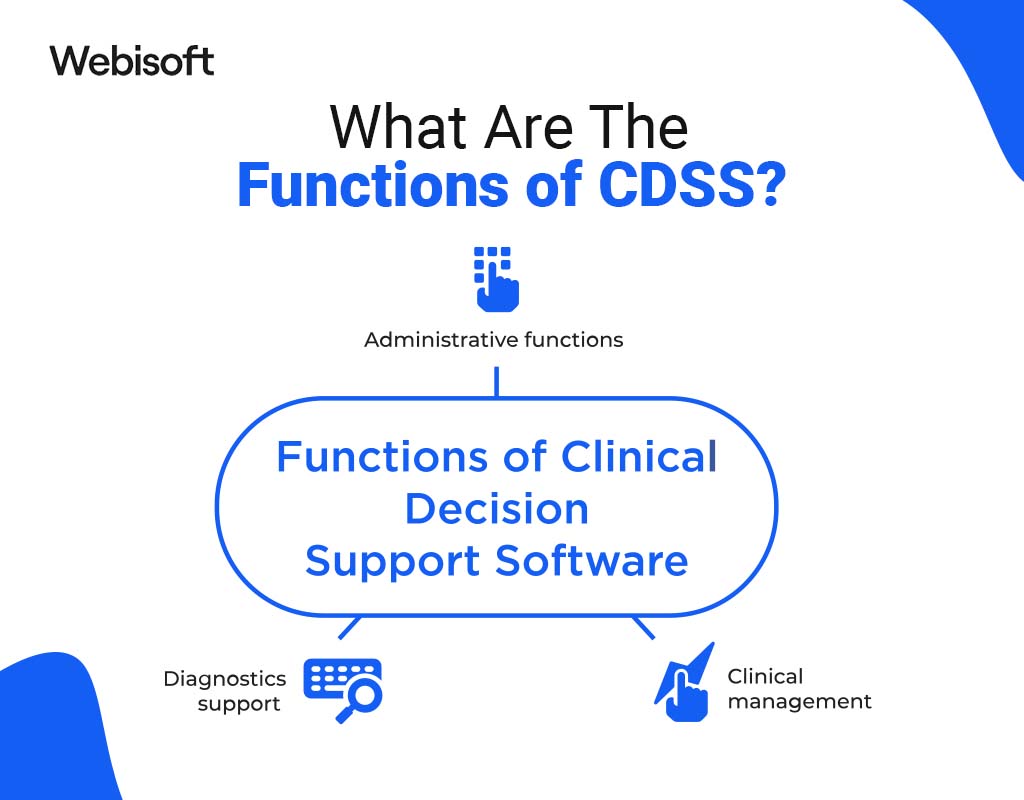
1. Alerts and Reminders
A pivotal function of Clinical Decision Support Systems (CDSS) is the provision of alerts and reminders to healthcare providers. These notifications can encompass a wide range of patient care activities.
For instance, CDSS can send reminders about upcoming patient appointments or flag critical preventive care measures that need to be taken.
These alerts and reminders ensure that no crucial aspect of patient care is overlooked. Thereby it is enhancing the efficiency and effectiveness of healthcare delivery.
2. Clinical Guidelines
Another significant role of CDSS is the provision of evidence-based clinical guidelines. These guidelines are derived from a wealth of medical research and clinical trials, ensuring that they reflect the latest advancements in medical science.
By providing these guidelines, CDSS assists healthcare providers in making informed decisions about patient care.
This alignment of patient care with the latest medical research improves healthcare quality, leading to better patient outcomes and increased patient satisfaction.
3. Patient Data Reports and Dashboards
Generating detailed patient data reports and dashboards is another critical function of CDSS. These reports provide a comprehensive overview of the patient’s health profile.
It includes their medical history, current health conditions, ongoing treatments, and potential health risks. The dashboards visually represent this data, making it easier for healthcare providers to understand, interpret, and act upon.
This feature of CDSS enhances data-driven decision-making in healthcare. It leads to more personalized and effective patient care.
4. Diagnostic Support
Diagnostic support is a crucial function of CDSS. By analyzing patient data, CDSS can assist healthcare providers in diagnosing diseases accurately.
This process involves identifying patterns and correlations in the patient’s data that may indicate specific health conditions.
Using CDSS for diagnostic support can significantly reduce the risk of misdiagnosis. It leads to more effective treatment plans and better patient outcomes.
5. Therapy Planning and Critiquing
The final function of CDSS is therapy planning and critiquing. CDSS can provide feedback on proposed treatment plans based on the patient’s unique health profile and the latest medical research.
This feedback can include critiques of the proposed plan, suggestions for alternative treatments, or recommendations for additional tests or procedures.
The feedback can help healthcare providers optimize treatment plans. It leads to more personalized and effective healthcare solutions. CDSS serves several critical functions in healthcare, all aimed at improving healthcare decision-making.
As the healthcare industry continues to evolve, the role of CDSS in healthcare decision-making is set to become increasingly important. The future of healthcare is here, powered by Clinical Decision Support Systems.
Implementing CDSS Effectively
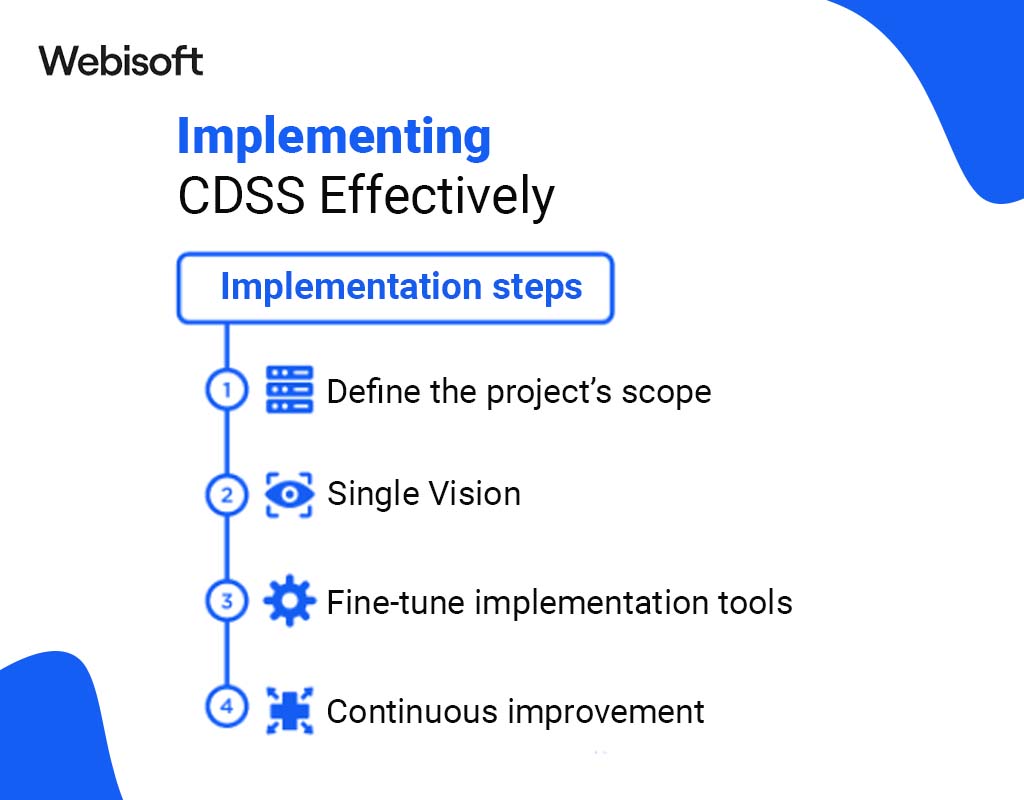
Effective implementation of CDSS involves a series of steps, from identifying needs to regular monitoring and evaluation. By following these steps, healthcare settings can ensure they reap the full benefits of CDSS.
As the healthcare industry continues to evolve, the role of CDSS in healthcare decision-making is set to become increasingly important. The future of healthcare is here, powered by Clinical Decision Support Systems.
Effective implementation of CDSS involves several steps:
1. Identifying Needs
The first step towards effective implementation of Clinical Decision Support Systems (CDSS) involves identifying the specific needs of your healthcare setting.
This process requires a thorough understanding of the challenges faced in your healthcare delivery and the areas where decision support could be beneficial.
By identifying these needs, you can ensure that your chosen CDSS aligns with your healthcare objectives.
2. Choosing the Right CDSS
The next step is selecting a CDSS that best meets your identified needs. This involves evaluating different CDSS options based on their features, capabilities, and compatibility with your healthcare setting.
The right CDSS should address your current needs and be scalable to meet future requirements.
3. Integration with Existing Systems
Another crucial step is ensuring that the chosen CDSS integrates well with your existing health information systems. Seamless integration is essential for the smooth exchange of data between systems.
This integration allows the CDSS to access and analyze the necessary patient data, enhancing its effectiveness.
4. Training Staff
Providing adequate training to healthcare providers on using the CDSS is critical to the implementation process.
This training should cover the essential operation of the CDSS, as well as how to interpret and apply its recommendations. Therefore you can ensure that they can use the CDSS effectively.
5. Monitoring and Evaluating
The final step in the implementation process is to monitor and evaluate the effectiveness of the CDSS regularly. It involves assessing whether the CDSS meets its intended objectives and contributes to improved healthcare outcomes.
Regular monitoring and evaluation can help you identify any issues. Ensuring that the CDSS continues to provide value.
Benefits of Clinical Decision Support Software
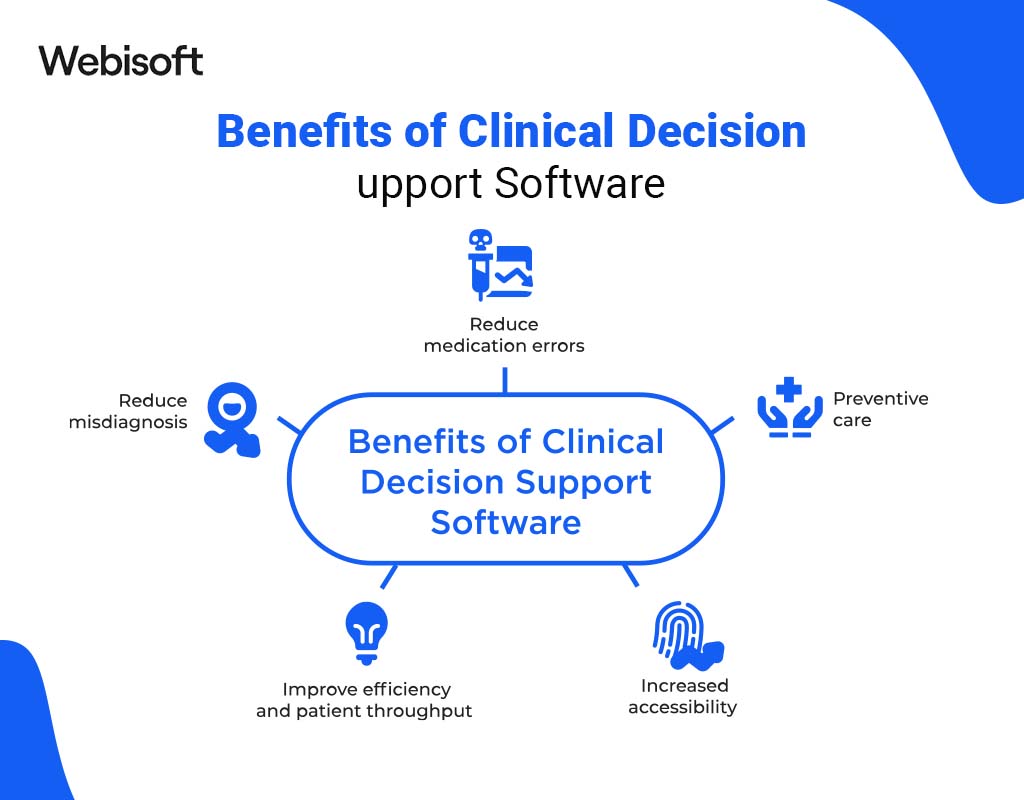
CDSS offers several benefits, from improved healthcare quality to significant cost savings. By providing evidence-based recommendations, streamlining healthcare processes, reducing errors, enhancing patient outcomes, and saving costs, CDSS can revolutionize healthcare delivery.
As the healthcare industry continues to evolve, the role of CDSS in healthcare decision-making is set to become increasingly important. The future of healthcare is here, powered by Clinical Decision Support Software.
1. Improved Healthcare Quality
One of the most significant benefits of Clinical Decision Support Software (CDSS) is its ability to enhance healthcare quality. CDSS operates by providing evidence-based recommendations which are derived from extensive medical research and clinical trials.
These recommendations guide healthcare providers in delivering optimal patient care. By ensuring that patient care aligns with the latest medical research, CDSS contributes to improved healthcare quality.
This alignment leads to more effective treatment strategies. Thereby it is improving the overall quality of care and patient satisfaction.
2. Increased Efficiency
Efficiency in healthcare processes is another substantial benefit offered by CDSS. The system is designed to automate routine tasks and streamline the decision-making process. This streamlining can save valuable time for healthcare providers.
It allows them to focus more on patient care and less on administrative tasks. By increasing efficiency, CDSS can enhance the productivity of healthcare providers, leading to improved healthcare delivery and patient outcomes.
3. Reduced Errors
Error reduction is a crucial advantage of implementing CDSS. The system is designed to send alerts and reminders to healthcare providers about various patient care activities.
These alerts can range from medication administration reminders to alerts about potential health risks. By providing these timely alerts, CDSS can significantly reduce the risk of oversight or errors in patient care.
Reducing errors contributes to safer and more reliable healthcare delivery. It can enhance patient trust and satisfaction.
4. Enhanced Patient Outcomes
CDSS also plays a crucial role in enhancing patient outcomes. The system assists in the diagnosis and treatment planning process by analyzing patient data and providing personalized recommendations.
CDSS can significantly improve patient outcomes. This personalized approach to healthcare not only leads to better health outcomes but also increases patient satisfaction.
5. Cost Savings
Finally, implementing CDSS can lead to significant cost savings in healthcare. By improving efficiency and reducing errors, CDSS can lower the overall cost of healthcare delivery.
These cost savings can be substantial. It allows healthcare institutions to reinvest these funds into other patient care areas or healthcare improvement.
This financial benefit of CDSS makes it a tool for improving patient care and a smart investment for healthcare institutions.
End Note
Clinical decision support system software is revolutionizing healthcare decision-making. By providing timely, accurate, and personalized information, CDSS enhances care quality, improves patient outcomes, and increases efficiency.
As healthcare continues to change, the role of CDSS will only become more critical, making it an essential tool in the arsenal of modern healthcare.So, ready to integrate advanced CDSS into your healthcare services and take patient care to the next level? Reach out to Webisoft for cutting-edge software solutions that empower healthcare professionals and benefit patients.
